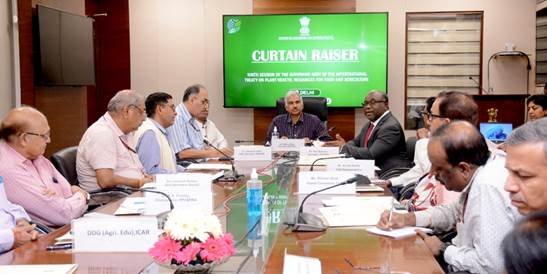Friday, 13 February 2026

Participating countries to deliberate upon the pivotal issues related to the development, conservation and protection of Plant Genetic Resources for the benefit of farming community
India hosts the 9th Session of Governing Body (GB9) of the ‘International Treaty on Plant Genetic Resources for Food and Agriculture’ (ITPGRFA) from 19-24th September 2022 in New Delhi. Secretary, Agriculture & Farmers Welfare (A&FW) said the biodiversity in food & agriculture needs to be conserved to protect the rights of the farmers. He informs that eminent scientists and resource persons will participate from many countries across the globe. Deliberations during the session will facilitate to develop the climate resilient varieties and also a roadmap for exchange of scientific information on plant genetic resources for increasing crop production and productivity, he adds.
Kent Nnadozie, Secretary (ITPGRFA) in his remarks said that the organization of 9th session of ITPGRFA provides a common platform for all the participating countries to deliberate upon the pivotal issues related to the development, conservation and protection of Plant Genetic Resources for the benefit of farming community.
He further said that the scientific exchange of technological advancement among the countries will help mitigate the adverse impacts of climate change and food security globally.
Dr. Himanshu Pathak, Secretary DARE & Director General (ICAR) said that the plant genetic resources available with different countries will act as base material for development of new varieties to ensure better quality and higher productivity of crops.
The GB9 will consider the options for encouraging, guiding and promoting the realization of Farmers’ Rights as set out in Article 9 of the Treaty, developed by an ad hoc Technical Expert Group on Farmers’ Rights. The GB9 is expected to deliberate on the outcome of informal consultations as well as status of Treaty’s Multilateral System (MLS) implementation to guide future steps necessary for the enhancement of the MLS, which is considered vital for agricultural research, development and global food security.
India is endowed with rich crop genetic resources and has successfully established legal, institutional and scholastic infrastructure to utilize the genetic diversity for breeding new varieties. With this unique status and as GB9 host, India is expected to play a crucial role in minimizing the dissonance between technology-rich developed and gene-rich developing countries to achieve functional resolutions on critical agenda items. The GB9 provides an excellent opportunity to convey the steadfast commitment of India to conservation and sustainable utilization of plant genetic diversity as well as farmers’ rights